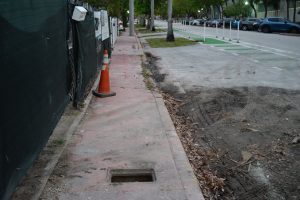 Owners and occupiers of premises have a duty to warn invitees (e.g., shoppers in mall, residents of condominium) of latent or concealed perils of which they know or should know. Krol v. City of Orlando, 778 So. 2d 492 (Fla. 5th DCA 2001).
Owners and occupiers of premises have a duty to warn invitees (e.g., shoppers in mall, residents of condominium) of latent or concealed perils of which they know or should know. Krol v. City of Orlando, 778 So. 2d 492 (Fla. 5th DCA 2001).
Conditions such as uneven floor levels and sidewalk curbs have been found by Florida courts to be open and obvious. E.g., Bowles v. Elkes Pontiac Co., 63 So. 2d 769, 772 (Fla. 1952) (concluding that uneven floor levels in public places do not constitute latent, hidden, and dangerous conditions); Gorin v. City of St. Augustine, 595 So. 2d 1062, 1062 (Fla. 5th DCA 1992) (concluding that sidewalk curb used as platform to pick up and drop off passengers riding a tram is not hidden dangerous condition); Aventura Mall Venture v. Olson, 561 So. 2d 319, 320 (Fla. 3d DCA 1990) (finding that six-inch sidewalk curb located at a mall is not “concealed or latent danger”).
The obvious danger doctrine recognizes that owners and occupiers should be legally permitted to assume that an invitee will perceive that which would be obvious upon the ordinary use of their senses. See Circle K Convenience Stores, Inc. v. Ferguson, 556 So. 2d 1207, 1208 (Fla. 5th DCA 1990). This doctrine is counterbalanced by the principle that a landowner’s duty to maintain his premises in a reasonably safe condition is not discharged by the dangerous condition being open and obvious. De Cruz-Haymer v. Festival Food Mkt., Inc., 117 So.3d 885, 888 (Fla. 4th DCA 2013).
Some conditions are so obvious and not inherently dangerous that a failure to maintain the premises in a reasonably safe condition will not give rise to liability. See, e.g., Schoen v. Gilbert, 436 So.2d 75 (Fla.1983) (holding difference in floor levels is not inherently dangerous condition, even in dim lighting, so as to constitute failure to use due care for safety of person invited to premises). Other conditions are dangerous, but are so open and obvious that an invitee may be reasonably expected to discover them and to protect himself. See, e.g., Ashcroft v. Calder Race Course, Inc., 492 So.2d 1309, 1311 (Fla.1986). In these circumstances, the landowner is absolved of liability unless the landowner should anticipate or foresee harm from the dangerous condition despite such knowledge or obviousness. Id.; Etheredge v. Walt Disney World Co., 999 So.2d 669, 672 (Fla. 5th DCA 2008); Aguiar v. Walt Disney World Hospitality, 920 So.2d 1233, 1234 (Fla. 5th DCA 2006).
Middleton v. Don Asher & Associates, 262 So. 3d 870 (Fla. 5th DCA 2019), is a trip and fall case involving a cracked and uneven sidewalk. The trial judge granted summary judgment for the Appellees based on the argument that they did not have a duty to warn because the uneven joint between the two concrete sidewalk segments was open and obvious. On appeal, the summary judgment was reversed and the cause was remanded for further proceedings. The DCA agreed with Defendant that, because the condition was open and obvious, it did not have a duty to warn. However, it felt that “a factual issue remained as to whether Appellees should have anticipated that, notwithstanding that the condition was obvious, condominium residents would use the sidewalk and proceed to encounter the cracked and uneven concrete, and could be harmed thereby.” Id at 873.
We have recently been asked to handle a case for a woman who fell to the ground and struck her face on the pavement after twisting her ankle in a pothole in a sidewalk. She now requires extensive dental work. The incident happened on private property, a condominium, after sunset under poorly lit conditions. She was unfamiar with the area and did not see the pothole. While the condition may have been open and obvious in daylight hours, it was not at night. Even if it had been O & O, it was foreseeable to the landowner that someone might nevertheless not see the dangerous condition and suffer a fall.
Premises liability cases are exceedingly fact-specific. A multitude of factors must be taken into account to determine the viability of a case. It is also important to take quick action to preserve evidence.
********************
Contact us at 305-758-4900 or by email (jgale@jeffgalelaw.com and kgale@jeffgalelaw.com) to learn your legal rights.
Jeffrey P. Gale, P.A. is a South Florida based law firm committed to the judicial system and to representing and obtaining justice for individuals – the poor, the injured, the forgotten, the voiceless, the defenseless and the damned, and to protecting the rights of such people from corporate and government oppression. We do not represent government, corporations or large business interests.
While prompt resolution of your legal matter is our goal, our approach is fundamentally different. Our clients are “people” and not “cases” or “files.” We take the time to build a relationship with our clients, realizing that only through meaningful interaction can we best serve their needs. In this manner, we have been able to best help those requiring legal representation.
DISCLAIMER: This information provided by Jeffrey P. Gale, P.A. is for informational purposes only and is intended to be used as a non-legal guide prior to consultation with an attorney familiar with your specific legal situation. It should not be considered legal advice or counseling. No such legal advice or counseling is either expressly or impliedly intended. This information is not a substitute for the advice or counsel of an attorney. If you require legal advice, you should seek the services of an attorney.
 Florida Injury Attorney Blawg
Florida Injury Attorney Blawg

